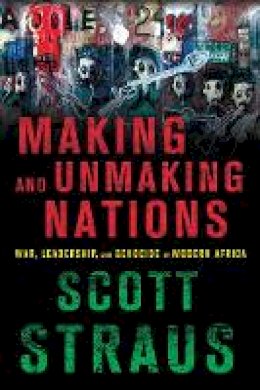
Making and Unmaking Nations: War, Leadership, and Genocide in Modern Africa
Scott Straus
Winner of the Grawmeyer Award for Ideas Improving World Order, 2018
Winner of the Joseph Lepgold Prize
Winner of the Best Books in Conflict Studies (APSA)
Winner of the Best Book in Human Rights (ISA)
In Making and Unmaking Nations, Scott Straus seeks to explain why and how genocide takes place—and, perhaps more important, how it has been avoided in places where it may have seemed likely or even inevitable. To solve that puzzle, he examines postcolonial Africa, analyzing countries in which genocide occurred and where it could have but did not. Why have there not been other Rwandas? Straus finds that deep-rooted ideologies—how leaders make their nations—shape strategies of violence and are central to what leads to or away from genocide. Other critical factors include the dynamics of war, the role of restraint, and the interaction between national and local actors in the staging of campaigns of large-scale violence.
Grounded in Straus's extensive fieldwork in contemporary Africa, the study of major twentieth-century cases of genocide, and the literature on genocide and political violence, Making and Unmaking Nations centers on cogent analyses of three nongenocide cases (Côte d'Ivoire, Mali, and Senegal) and two in which genocide took place (Rwanda and Sudan). Straus's empirical analysis is based in part on an original database of presidential speeches from 1960 to 2005. The book also includes a broad-gauge analysis of all major cases of large-scale violence in Africa since decolonization. Straus's insights into the causes of genocide will inform the study of political violence as well as giving policymakers and nongovernmental organizations valuable tools for the future.
Product Details
About Scott Straus
Reviews for Making and Unmaking Nations: War, Leadership, and Genocide in Modern Africa
Pierre Englebert, Pomona College
Political Science Quarterly
It is clear that Straus is interested in honestly exploring why genocides occur—and do not occur—rather than selecting favorable cases to promote a preconceived policy or theoretical agenda.... In the final analysis, this is a great book for anyone interested in studying genocide, state formation in Africa, the power-of-elite narrative, and policy responses to genocide.
Dan G. Cox
Miltary Review
Scott Straus has written an extremely important book, arguing that genocide has crucial ideological foundations, but that these conditions only lead to genocide when situational incentives drive a process of escalation. This contribution highlights the central role of ideas as a cause of genocide, while also outlining forces of restraint that can hold mass categorical violence at bay. Anyone interested in political violence must engage with this book.... Making and Unmaking Nations is a major achievement. Not only does it help us better understand the ever-vexing question of genocide, but it also identifies key open questions for future research and offers a set of useful policy diagnostics and prescriptions. As the prospect of mass killing looms over ongoing conflicts in the Middle East, Africa, and Asia, this is a particularly timely and important work.
Paul Staniland
Perspectives on Politics
Straus' previous book was a penetrating analysis of the 1994 genocide in Rwanda. Here, he returns to the issue of large-scale ethnic violence in Africa, demonstrating an impressive command of the historical material to contrast the cases of Rwanda and Sudan, where genocides took place, with three cases in which ethnic conflict did not reach that point (Côte d'Ivoire, Mali, and Senegal). In the end, he concludes, whether interethnic strife results in genocide depends almost entirely on national leadership.
Nicolas van de Walle
Foreign Affairs
The originality of Straus's study lies in his focus on the intersection of local and national actors in their approach to ideas such as nationalism, violence and power....Making and Unmaking Nations is an original and interesting book.
Caroline Varin
International Affairs
A challenging read for its topic and nuance, [Making and Unmaking Nations] is nonetheless an important one for those interested in understanding how genocides come about and how genocidal impulses can be restrained.
Alex Alvarez, Northern Arizona University
Holocaust and Genocide Studies
